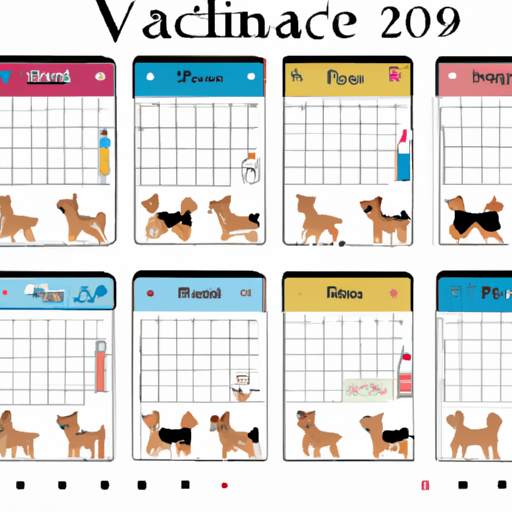Understanding The Importance Of Vaccination
As a caregiver, your primary concern is always the health and well-being of those you care for, including your four-legged friend. Vaccination is a crucial part of ensuring your dog’s health. It is the most effective method of preventing infectious diseases, some of which can be fatal. Think of vaccines as a shield, protecting your dog from harmful viruses and bacteria, thereby ensuring that your pet lives a long, healthy, and happy life.
The Puppy Vaccination Schedule
When it comes to vaccination, age matters. Puppies, being young and with less developed immune systems, are especially vulnerable to diseases. The American Animal Hospital Association (AAHA) recommends the following schedule for puppy vaccinations:
- Distemper, Parvovirus: Starting at 6-8 weeks of age, then boost every 3-4 weeks until 16 weeks of age.
- Rabies: Given at 12-16 weeks of age (laws vary by state).
- Leptospirosis, Lyme disease: Depending upon your dog’s risk and lifestyle, these may be recommended.
Adult Dog Vaccination Schedule
As your dog grows older, the frequency of vaccines changes. Adult dogs generally need fewer vaccinations than puppies. Here’s a typical vaccination schedule for adult dogs:
| Vaccine | Frequency |
|---|---|
| Rabies | Every 1-3 years |
| Distemper, Parvovirus | Every 3 years |
| Leptospirosis, Lyme disease | Annually, if risk factors are present |
Remember, this is just a general guide. Your vet will provide a personalized schedule based on your dog’s health, lifestyle, and risk factors.
Potential Side Effects Of Vaccination
Just like with human vaccines, dog vaccines can also have side effects. Most are mild and temporary, but it’s essential to be aware of them so you can monitor your pet after vaccination. Side effects can include:
- Mild fever
- Decreased appetite and activity
- Swelling or tenderness at the injection site
Contact your vet immediately if your dog has a severe reaction, such as difficulty breathing or collapse.
Importance Of Regular Vet Check-ups
While vaccines are a crucial part of your dog’s health care, they are not a substitute for regular vet check-ups. Regular check-ups allow your vet to detect potential health problems early, monitor your dog’s overall health, and adjust the vaccination schedule if needed.
FAQ
Q: Can I vaccinate my dog at home?
A: While some vaccines are available for purchase, it’s highly recommended to have a vet administer them. They can monitor for adverse reactions and ensure the vaccine is given correctly.
Q: Do indoor dogs need to be vaccinated?
A: Yes, even indoor dogs are at risk of diseases like rabies, which can be brought into the home by other animals or humans.
Q: Can vaccinations make my dog sick?
A: While vaccines can cause mild side effects, they are generally safe and much less dangerous than the diseases they protect against.
Q: My dog is old. Does he still need vaccinations?
A: Yes, older dogs need vaccinations too. However, the vet may adjust the schedule based on the dog’s health and risk factors.
Remember, your dog’s health is a shared responsibility. Vaccinations are an essential part of this responsibility. Your canine companion trusts you with their well-being. Let’s ensure we don’t let them down.



